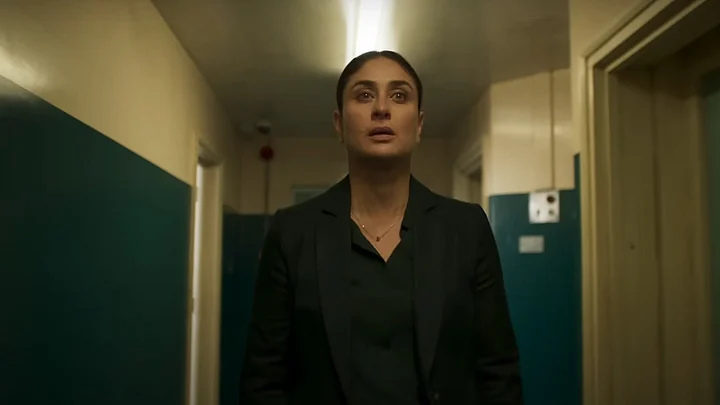The past few years have seen several murder mysteries, particularly in streaming shows. Some of the best ones have been more social dramas than crime thrillers, using the template to uncover not just “whodunnit” but also interconnected webs of socio-political and cultural issues that lay beneath the surface. While we’re definitely reaching a saturation point with the genre, Hansal Mehta’s The Buckingham Murders largely manages to break the clutter and stand out as a taut, layered police procedural.
Produced by Kareena Kapoor Khan, Shobha Kapoor and Ekta Kapoor, the slow-burning film is held together by Kapoor Khan’s consistently restrained performance that remains free of any vanity or histrionics.
The Buckingham Murders follows Jasmeet "Jass" Bhamra (Kapoor Khan), a detective haunted by the loss of her son, who was killed by a wayward addict. Unable to cope with the grief, she requests for a transfer to High Wycombe, Buckinghamshire, only to be faced with a case that hits too close to home: a young boy––Ishpreet Kohli, of a similar age as Jass’s son––is missing, and as it soon turns out, has been murdered. Who killed him and why? That’s what DS Jass, along with her superior DI Hardik “Hardy” Patel (a stoic Ash Tandon), is tasked with figuring out. But the two seem to be at odds with each other. Can their interests align to solve this case?
The investigation unearths the rot across the communities. Ishpreet’s father, Daljeet (Ranveer Brar, volatile and explosive), is still grieving his mother’s death in the Covid-19 pandemic and is frustrated by his financial difficulties. His wife, Preeti (an aching Prabhleen Sandhu) feels trapped in a loveless, abusive marriage in a foreign country. Teenage boys are involved in drug-dealing and struggle with addiction. There’s more than meets the eye with Saquib Chaudhary (a compelling Kapil Redekar), a Pakistani-British teenager who’s the prime suspect. A former drug dealer is trying to reform himself after a woman he sold to suffers irreparable harm. Any of these people could be the killer, with their various traumas providing different twisted motives for the murder.
The film’s writing is dense, but remains nuanced in its treatment of these various social issues. It’s not bent on letting any religious community off the hook, nor does it jump to easy conclusions or give us moral lectures. Mehta’s gaze remains sensitive and analytical, never judgmental, seeking to examine why people behave the way they do and the various constraints in which they find themselves caged. The Buckingham Murders is also very well-researched, authentically rendering the subtleties of the South Asian communities in England, be it their accents, mannerisms, or dressing. Dialogues switch seamlessly between English, Hindi/Urdu, and Punjabi, reflecting its immigrant characters’ hyphenated identities.
Given the maturity of its subject matter, the pacing of The Buckingham Murders never feels urgent. It doesn’t offer much in terms of thrills or suspense that one might expect in this genre. The filmmaking craft, too, from the shooting to the editing style, is relatively simple. Avoiding any frills, Mehta relies on the sophisticated writing and fine performances across the mainly British supporting cast to ground the story in a sense of realism. According to Kapoor Khan, her role was inspired by Kate Winslet's character in Max’s miniseries Mare of Easttown, which had similar tonality, themes, and colour palettes. Mehta’s Wycombe is similarly dark and monochromatic. Kapoor Khan’s performance also feels comparably controlled and measured; she never falters, even when the film’s writing sometimes does.
One limitation, for instance, is that Jass’s character doesn’t get enough moments to breathe: the one time she goes on a run on her own, it’s used to establish another plot point. We don’t get to spend enough time with her outside the case or learn quite enough about her––beyond her grief, loneliness, and steely resolve––to fully invest in her journey. This is why The Buckingham Murders cannot quite match the complexity, depth, and insight it aspires to.
A larger problem is the unevenness of the screenplay: the first half includes a lot of exposition, most of which is well-conveyed, but it saddles the latter part of the film with simply too many revelations stuffed together. The last 20 minutes feels particularly dizzying. I wish the beginning could be more condensed, especially before Jass gets to Wycombe and the initial build-up of the case.
Despite these bumps, however, Mehta steers The Buckingham Murders to a deeply affecting ending. At just under two hours, the film remains a mostly tight and gripping drama that might sometimes test your patience but will never lose your attention. Mehta has stated that The Buckingham Murders is the first part of a franchise, which seems immensely promising.
It has the potential to be the kind of global South Asian cinema that captures the diasporic experience, all within the framework of compelling murder mysteries with an excellent Kapoor Khan at the helm. I hope we get even more from Jass and the messy, greyscale world she inhabits.
